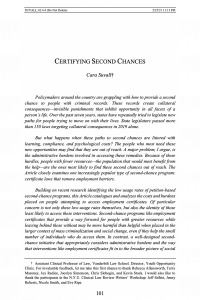Certifying Second Chances
Cara Suvall, Cardozo Law Review
The premise of this article is that policymakers around the country are grappling with how to provide a second chance to people with criminal records, which the author asserts, create collateral consequences—invisible punishments that inhibit opportunity in all facets of a person’s life. The article highlights that, over the past seven years, states have repeatedly tried to legislate new paths for people trying to move on with their lives, including the fact that state legislators passed more than 150 laws targeting collateral consequences in 2019 alone.
Building on recent research identifying the low usage rates of petition-based second-chance programs, this article catalogues and analyzes, according to the author, the costs and burdens placed on people attempting to access employment certificates. The author asserts that second-chance programs like employment certificates that provide a way forward for people with greater resources while leaving behind those without may be more harmful than helpful when placed in the larger context of mass criminalization and social change, even if they help the small number of individuals who do access them. In contrast, the author argues, a well-designed second-chance initiative that appropriately considers administrative burdens and the way that interventions like employment certificates fit in to the broader picture of social change could provide short-term benefits to people with criminal records while also bolstering larger-scale reforms to the criminal legal system.
